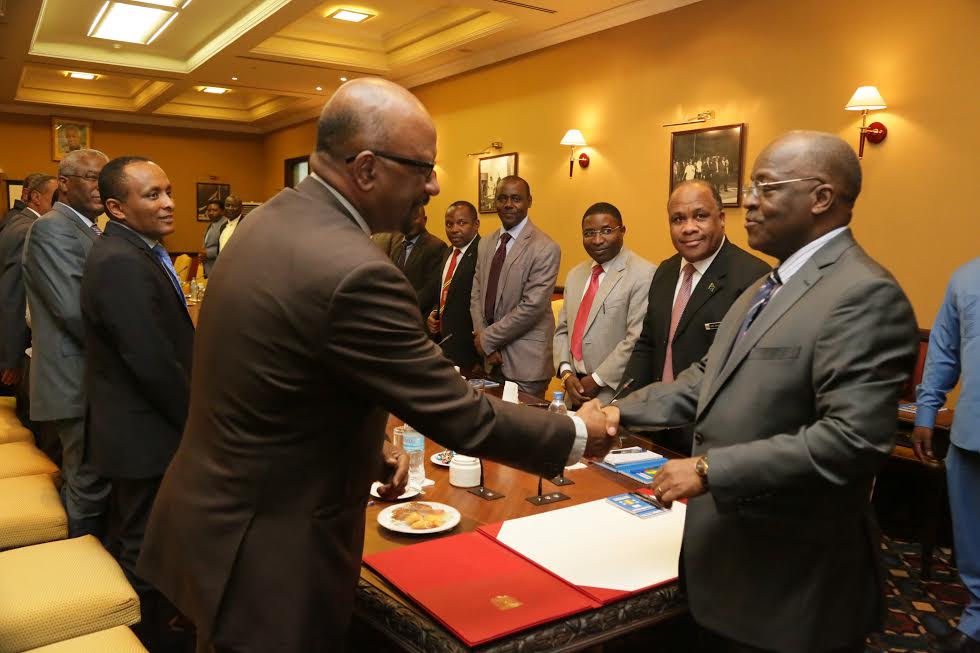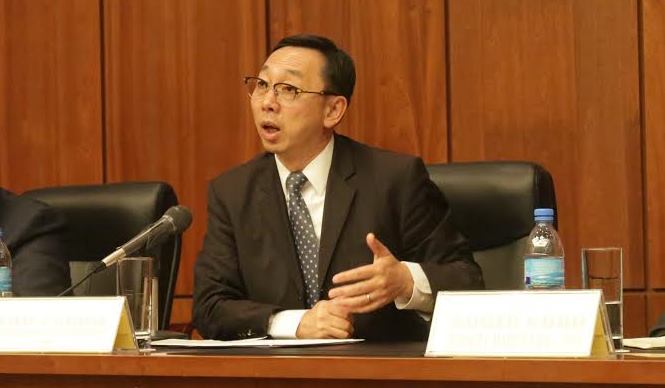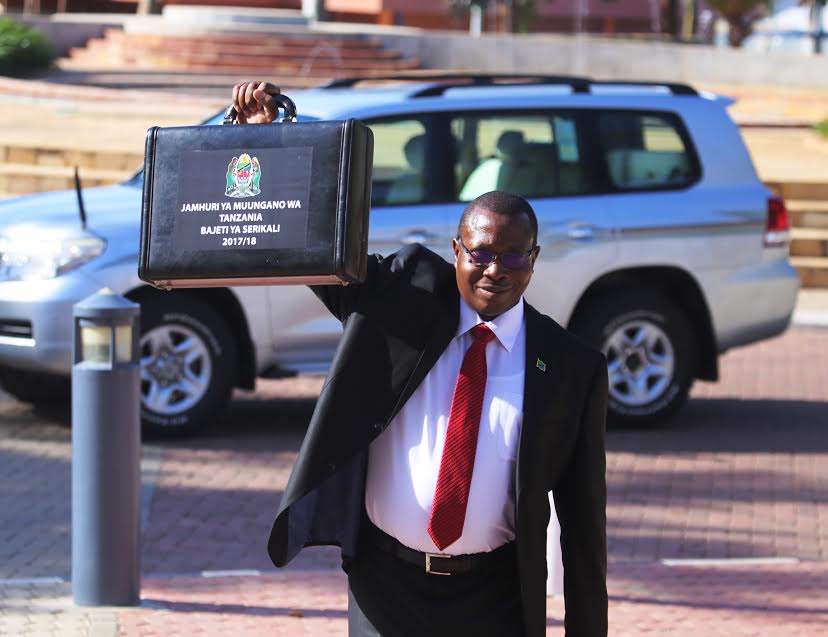Some analysts are suggesting that Tanzania should consider seriously taking measures which will quickly lead into borrowing from external bond markets…
By TZ Business News Staff.
The Tanzania Government revenue projections for fiscal year 2017/18 are “potentially overoptimistic,” the International Monetary Fund (IMF) has warned, advising the Administration to delay some large projects until revenue is certain.
“The 2017/18 budget reaffirms the authorities’ objective of scaling up public investment while preserving fiscal sustainability. However, potentially overoptimistic revenue projections call for its prudent implementation, including by delaying some large projects until the availability of revenues is confirmed during the mid-year budget review.” the IMF says in a statement distributed on June 26, 2017.
In the statement, , Mr. Tao Zhang, the IMF Deputy Managing Director and Acting Executive Board Chairman says “ [Tanzania] Budget execution in 2016/17 faced challenges, mainly due to external financing shortfalls that led to low execution of capital spending and a tight liquidity situation.
“Recent efforts to step up external financing mobilization and ease the liquidity situation should help enhance budget implementation, avoid further accumulation of domestic payment arrears, and support credit to the private sector.”
Zhang concedes Authorities in Tanzania are committed to pursue further public financial management reforms, including strengthening commitment controls to limit the accumulation of new domestic payment arrears but he counsels: “To achieve the authorities’ development agenda and maintain high economic growth, sustained implementation of reforms, including to create a better and more predictable business environment, is critical.”
“Recent measures to loosen the monetary policy stance are appropriate given the benign inflation outlook and decelerating credit growth,” Zhang says. “Going forward, the duration and extent of monetary loosening should be coordinated with fiscal developments. Efforts to transition toward a forward-looking monetary policy framework should continue swiftly. Plans to foster credit standards and increase capital buffers are key initiatives to ensure the banking system’s soundness.”
The Tanzania Finance and Planning Minister, Dr Philip Mpango tabled the country’s 2017/18 budget at Parliament in Dodoma, central Tanzania in early June, 2017. The Minister announced a 7.5% budget increase to Tsh. 31.71 trillion/- this financial year, up from Tsh. 29.5 trillion/- last financial year.
The Tsh. 31.7 tr/- budget for 2017/18 fiscal year is planned to finance the second year of Tanzania’s Five Year Development Plan II which focuses on several huge projects including construction of a Standard Gauge Railway (SGR), revamping of Air Tanzania Company Limited (ATCL), and developing Mchuchuma Coal Mining and Liganga Iron Ore Mining projects.
The plan also focuses on construction of a Liquefied Natural Gas (LNG) plant in Lindi Region, establishment of Special Economic Zones (SEZ) in Tanga, Bagamoyo, Kigoma, Ruvuma and Mtwara; establishment of Kurasini Logistics Centre, and procurement of new ships and the rehabilitation of existing ships in lake Victoria, Tanganyika, and lake Nyasa.
Tanzania President John Pombe Magufuli also envisions creating of an industrial nation by 2025 which needs electricity supply that is certain. The Government has consequently invited hydro-electric power supply specialists from Ethiopia to assess construction of hydro-electric dam at a location called Stigler’s Gorge in the vicinity of the Selous Game Reserve in Coast Region.
The President announced the plan to build a hydro-electricity dam at Stiegler’s Gorge during his working tour of the Coast Region in late June, saying the project will increase power generation to boost the country’s industrialisation process. The hydro-power project is planned to produce 5000 Megawatts by 2021.
A team of experts from Ethiopia led by the country’s Minister for Water, Energy and Irrigation, Dr. Seleshi Bekele has already visited the Stigler’s Gorge waterfall. The team included Dr. Negede Kassa, Chief Executive Officer of the Company called Ethiopian Construction Design and Supervision.

President John Pombe Magufuli (R-foreground) welcomes Ethiopian Minister for Water, Energy and Irrigation, Dr. Seleshi Bekele at State House in Dar es Salaam. The Ethiopian Minister was in Dar es Salaam leading a team of Ethiopian Hydro-electricity dam construction experts.
.
Projects listed during the 2017/18 budget session join a list of projects announced in 2016 when Dr. Mpango said the national debt stock was increased by 6.34 per cent from $19.69 billion in June 2015 to $ 20.94 billion the following year to finance various big development projects including the Bus Rapid Transit (BRT) System, the expansion of the Julius Nyerere International Airport, the Ruvu Water Treatment Plant, the Strategic Cities Project, as well as construction of the 240-MW Kinyerezi II Gas-Fired Power Plant, the Mtwara-Dar es Salaam Natural Gas Pipeline, the Arusha – Holili/Taveta – Voi Road, the Nyerere Bridge and other development projects.
The IMF has said in the Statement: “Tanzania’s performance under the Policy Support Instrument has been satisfactory, macroeconomic performance has been strong, and the medium-term outlook remains favourable,” but has added that
“Going forward, continued sound macroeconomic policies and increased efforts to advance structural reforms will be essential to sustain macroeconomic stability and high economic growth, and deliver on the development agenda.”
To achieve budgetary objectives during fiscal year 2017/18, the government has said it plans to borrow Tsh. 6.17tri/-shillings from domestic sources while it expects 3.97tri/-from external concessional loans and grants. It will also seek an additional 1.59tri/- from external non-concessional loans. That adds up to be Tsh. 11.73 tr/-. But where does the rest of the money come from to bridge the gap between Tsh. 31.7 tr/- and This tiny fraction of Tsh. 11.73 tr/-?
The Government owned Daily News said direct exports of minerals from mines will be banned; instead clearing houses will be established at international airports and other appropriate places where a 1.0 per cent clearing fee on the value of minerals will be imposed to increase revenue from mineral resources.
ACACIA, the most significant mining company in the country have said in a press statement they do not like this new clearing fee–which suggests compliance might be tricky.
The new budget also seeks to introduce a Withholding Tax of 5.0 per cent of the total value of minerals to all small scale miners to ensure optimal collection of government revenue. But significance of contribution to Tanzania’s GDP of small scale miners is unclear. The budget plan states that a new revenue collection method is to be introduced to increase efficiency in all areas the Government collects revenue.
Through the new method all ministries, government departments and institutions will now use the Government Electronic Payment Gateway System and Electronic Revenue Collection System (e-RCS) while other revenues will be generated from taxing houses. The government will demand a flat rate tax of 10,000/- for houses that have not been valued and 50,000/- for each floor in a storey house.
The budget execution in 2016/17 faced challenges due to external financing shortfalls that led to low execution of capital spending and a tight liquidity situation. In IMF’s view, efforts to step up external financing mobilization and ease the liquidity situation will help enhance budget implementation.
Some analysts have suggested that Tanzania should consider seriously taking measures which will quickly lead into borrowing from external bond markets such as the Euro bond.
Lusajo Mwankemwa, an economic analyst from the Department of Research and Economic Policy at the Bank of Tanzania recently told reporters the nation’s current ratio of Total Government Debt to Gross Domestic Product (GDP) stands at 34.2%, which compares favorably to the acceptable ratio cap at 56%.





